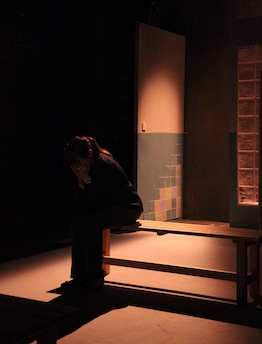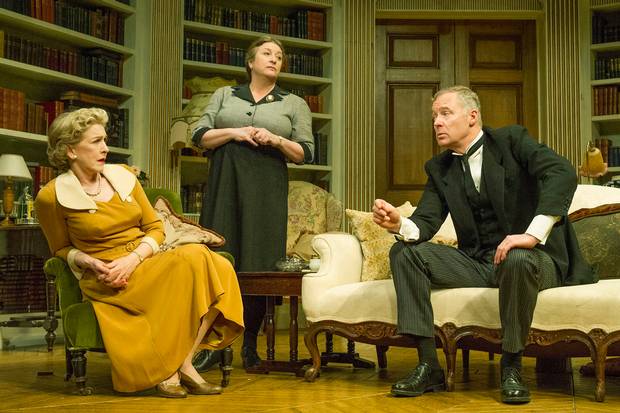Cripes. How did I get that one wrong? A few issues back I blithely predicted that Harry Hill’s musical I Can’t Sing would run for three years. It closes this month, so I’m a little reluctant to praise another glittering comedy, Relative Values by Noël Coward, which, like Hill’s stricken satire, has received a few snubs from the critics.
In his early dramas, Coward portrayed servants as amiable bunglers or bossy cynics and he rarely gave them more than one wisecrack per act. In Hay Fever, for example, the leading lady can’t even recall the housekeeper’s name, and her forgetfulness is supposed to be funny and attractive. Relative Values dates from 1951, when domestic service was in decline and social divisions were being steam-rollered flat. Coward’s response was to write a play in which the servants are fully realised characters who offer their employers shrewd advice and emotional support. It’s a fascinating slice of social history that shows the poshest of the posh grappling with the death of pedigree.
We meet an aristocratic clan whose heir is about to marry an upstart film star, Miranda, who has an elder sister, Moxie, whom she hasn’t seen for years. And Moxie happens to be the personal maid of the family matriarch, Lady Felicity. This device gives Moxie dual nationality: she’s a lowly servant but she’s also about to become kin to a family of earls. The anxieties pile up as the aristocrats, who are all witty and sophisticated sweethearts, caper around trying to deal with the coming earthquake.
The script does take some time to get its engines started. Half an hour is wasted on a plot twist that comes to nothing but finally, in Act III, the trap is set and the fun begins. Moxie, disguised as a genteel spinster, is introduced to Miranda, who fails to recognise her. Worse, Miranda embarks on a sob story about her destitute childhood in a slum in Brixton with a dipso mother and a slovenly older sister. Caroline Quentin, as Moxie, responds to these slanders with a masterful display of restrained clowning. And the comedy is shot through with sadness because Moxie is a warm, proud and intelligent creature who is genuinely hurt by her sister’s betrayal.
A dashing American film star shows up determined to bag Miranda for himself and Lady Felicity manipulates him, and everyone else, in order to secure her long-term goals. The gags are as good as anything Coward wrote and the ensemble work in Trevor Nunn’s production is quietly dazzling. Patricia Hodge, on deliciously wicked form, conceals Lady Felicity’s killer instincts behind a mask of cheery pragmatism. And there’s fine work from Ben Mansfield as a jittery, hyped-up heart-throb. I expect that what prompted the coolness of the reviewers was that Moxie explicitly opts to remain a servant rather than moving up in society. And the superb Rory Bremner plays a clever, self-taught butler who eloquently denounces liberalism and the decline of social rank. (These speeches led to a health warning from the Guardian, whose critic attended a public school that predates Eton.) The only weak point is Leigh Zimmerman’s Miranda, who comes across as a brittle, hoity-toity brat. The script offers her scope to charm us, but Zimmermann’s strutting spikiness leaves a slightly sour taste. Activity at the box office hasn’t quite reached riot levels yet, and if you buy cheaper seats in the Royal Circle you’re likely to be upgraded for free. Well worth catching.

Archimedes’ Principle, at Park, concerns a child-abuse scandal. Or possibly not. It starts when a swimming-pool lifeguard consoles a distressed boy with a hug and a kiss in public. This embrace, misinterpreted by parents and supervisors, starts a storm of allegations and denials. The play’s structure is artful and intriguing. Disjointed scenes are arranged in overlapping sequences that reveal the story from different perspectives and keep the audience hooked. But then my doubts began to creep in. The suspect makes no attempt to defend himself, even though a solicitor’s letter, threatening his accusers with a lawsuit for defamation, would shut their mouths in less time than it takes to pop a balloon with a nail.
Then a hidden pair of kiddy’s trunks is found in his locker. Which is absurd. Guilty or innocent, he wouldn’t leave such a damning piece of evidence just lying around. An attack unit of vigilante parents encircles the swimming pool and pelts the windows with bricks and yet nobody calls the police. Completely bananas. The excellent opening scenes promised an intelligent examination of paedo-paranoia but it all imploded under the weight of its internal contradictions. And, besides, was the guy a molester or not? I haven’t a clue. I’m not sure the playwright had a clue either.
Got something to add? Join the discussion and comment below.
Get 10 issues for just $10
Subscribe to The Spectator Australia today for the next 10 magazine issues, plus full online access, for just $10.
You might disagree with half of it, but you’ll enjoy reading all of it. Try your first month for free, then just $2 a week for the remainder of your first year.














Comments
Don't miss out
Join the conversation with other Spectator Australia readers. Subscribe to leave a comment.
SUBSCRIBEAlready a subscriber? Log in